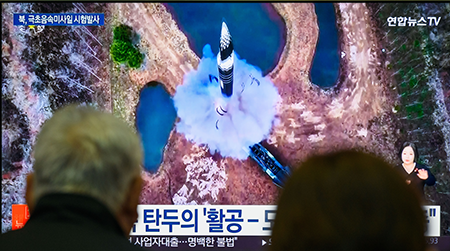"No one can solve this problem alone, but together we can change things for the better."
Grappling With North Korea’s Expanding Arsenal
September 2024
By Jean H. Lee
Former President Donald Trump has claimed that he and Kim Jong Un “fell in love” and speculated that the North Korean leader misses him.1 Vice President Kamala Harris has said she can promise one thing: she will not be exchanging love letters with Kim.2

Whoever occupies the White House in 2025, North Korea’s nuclear program will be exponentially more challenging. Over the past decade, Kim has been amassing the arsenal of his dreams, one that is bigger and more dangerous than ever, including solid-fueled ballistic missiles, hypersonic weapons, and submarine-launched ballistic missiles.3
The problem extends beyond the Korean peninsula. North Korea allegedly is providing Russia with ammunition and ballistic missiles for the war in Ukraine,4 as well as Hamas with rockets for the conflict in Gaza,5 thus underlining the urgency of addressing a threat with global implications.
Now is the time for the U.S. presidential nominees to develop careful strategies on how to do that. These policies must anticipate Kim’s actions. They need to be tough yet creative, and the candidates need to be pragmatic.
Going into the presidency with no plan would cede the advantage to North Korea, which already is working to intensify tensions by provoking South Korea and the United States.6 The tensions are part of a bid to draw attention to North Korea in the leadup to the U.S. election, influencing its outcome and flagging North Korea as a foreign policy priority for the next administration.
Yet, Kim will not make it easy even if Trump becomes president. Any sustainable nuclear deal with North Korea will be more difficult than ever to negotiate. Not only is Pyongyang’s arsenal bigger, but the sanctions regime is weakened, and the stakes are even higher, for Kim and for the world.
The burgeoning relationship between Russia and North Korea also makes diplomacy more difficult. Russian President Vladimir Putin’s state visit to Pyongyang in June yielded a military pact that gives North Korea the potential to acquire specialized technology that could enable further nuclear advancement under the guise of space exploration. A Russian veto at the UN Security Council has deprived the international community of a way to track North Korean sanctions violations.7
Meanwhile, Kim has worked to blunt the impact of sanctions and isolation by investing in cybertheft. North Korean hackers are accused of stealing more than $3 billion through cyberattacks in recent years.8 The North Koreans know they need a contingency plan to accommodate geopolitical shifts, including the possibility that Trump may lose. They are watching closely for opportunities, especially as they make tentative steps out of isolation. But that window might be brief.
Harris, if elected, should be swifter in introducing a revamped North Korea policy than President Joe Biden was in 2020. She should explore creative ways to provide North Korea with a face-saving way to return to nuclear negotiations. That means remaining aggressive against cybertheft while stepping up collaboration with allies, as well as China and maybe Russia, on shared proliferation concerns.9
The candidates need to show strength in the face of the North Korean threat, but they also need to display diplomatic dexterity in seizing the opportunity that a change of administration can offer. The alternative of four more years of unfettered North Korean nuclear development must be considered untenable.
ENDNOTES
1. Former President Donald Trump, speech at Republican National Convention, July 2024.
2. Council on Foreign Relations, “Candidates Answer CFR’s Questions,” n.d., https://www.cfr.org/election2020/candidates-answer-cfrs-questions.
3. See Arms Control Association, “Arms Control and Proliferation Profile,” June 2024, https://www.armscontrol.org/factsheets/arms-control-and-proliferation-profile-north-korea.
4. U.S. Defense Intelligence Agency, “North Korea: Enabling Russian Missile Strikes Against Ukraine,” May 2024, https://www.dia.mil/Portals/110/Documents/News/Military_Power_Publications/DPRK_Russia_NK_Enabling_Russian_Missile_Strikes_Against_Ukraine.pdf.
5. Kim Soo-yeon, “S. Korea’s Spy Agency Confirms Hamas’ Suspected Use of N. Korean Weapons,” Yonhap News Agency, January 8, 2024.
6. Mike Valerio, Yoonjung Seo, and Brad Lendon, “North Korea Claims It’s Sending 250 New Missile Launchers Toward the South Korean Border,” CNN, August 5, 2024, https://www.cnn.com/2024/08/04/asia/north-korea-new-missile-launchers-border-intl-hnk.
7. George Lopez, “With Russia’s U.N. Veto, Where Do North Korea Sanctions Go From Here?” U.S. Institute of Peace, June 30, 2024, https://www.usip.org/publications/2024/07/russias-un-veto-where-do-north-korea-sanctions-go-here.
8. Edith M. Lederer, “UN Experts Investigating 58 Suspected North Korean Cyberattacks Valued at About $3 Billion,” February 9, 2024, https://apnews.com/article/un-experts-north-korea-cyberattacks-nuclear-sanctions-8e84703049dfb4fda011829115777c9e.
9. U.S. Cybersecurity and Infrastructure Security Agency, “North Korea Cyber Threat Overview and Advisories,” n.d., https://www.cisa.gov/topics/cyber-threats-and-advisories/advanced-persistent-threats/north-korea (accessed August 11, 2024).
Jean H. Lee, a journalist who opened the AP news bureau in Pyongyang and reported from North Korea for nine years, co-hosts the Lazarus Heist podcast about North Korea for the BBC World Service.
